Connect Acuity Scheduling to Velocify with LeadsBridge


In this article, you'll learn how to set up the bridge and connect Acuity Scheduling to My CRM Example using LeadsBridge.
How to set up your bridge step-by-step tutorial
Before you start
- Head over to the left sidebar and click on the Create new Bridge green button
- You'll be taken to the first step of the bridge creation
Step 1: Choose the apps you want to connect
- Choose Acuity Scheduling as the source for your bridge
- Choose Velocify as the destination for your bridge
- Click on the Continue button
- At this point you can choose a name for your bridge (this will only be visible inside LeadsBridge and you can also edit it later)
Step 2: Configure your Acuity Scheduling with Velocify
Step 2.A: Setup your Acuity Scheduling integration
- Click on Connect Acuity Scheduling
- Click on Create new integration to connect your Acuity Scheduling (or select an existing one from the dropdown if you already connected it)
- A popup wil be opened where you can authorize the Acuity Scheduling integration
- Fill API Key field to connect Acuity Scheduling with LeadsBridge
- Click on the Authorize button
- You can choose a name for this Acuity Scheduling and LeadsBridge integration (you can also edit it later)
- Once done, click on Continue button and you will get back to the bridge experience where you could choose additional integration settings
- Now that your Acuity Scheduling is connected, you can continue with the set-up of your bridge
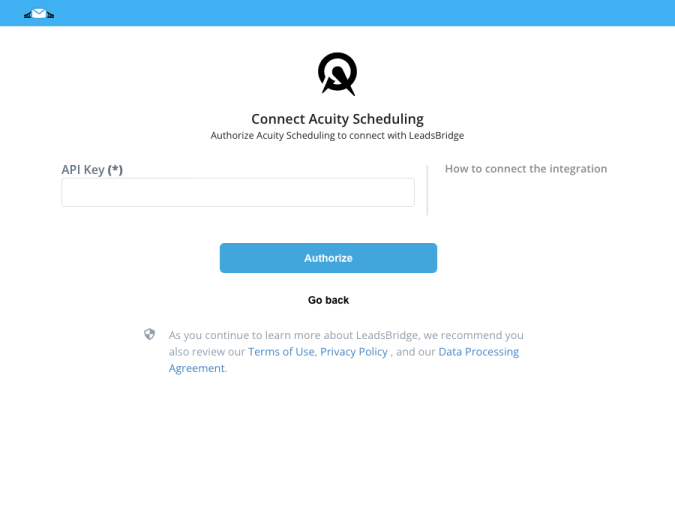

Step 2.B: Configuration details for Acuity Scheduling
Other Info
1. Find your API credentials in Acuity Scheduling left menu, under Business Settings → Integrations, or by clicking here
2. Then Copy and Paste your credentials on LeadsBridge Integration's page
2. Then Copy and Paste your credentials on LeadsBridge Integration's page
Step 2.C: Setup your Velocify integration
- Click on Connect Velocify
- Click on Create new integration to connect your Velocify (or select an existing one from the dropdown if you already connected it)
- A popup wil be opened where you can authorize the Velocify integration
- Fill Client ID, Campaign ID field to connect Velocify with LeadsBridge
- Click on the Authorize button
- You can choose a name for this Velocify and LeadsBridge integration (you can also edit it later)
- Once done, click on Continue button and you will get back to the bridge experience where you could choose additional integration settings
- Now that your Velocify is connected, you can continue with the set-up of your bridge
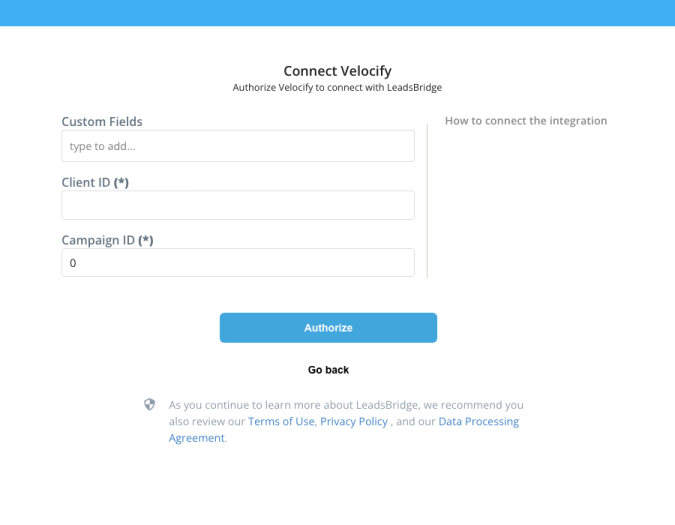

Step 2.D: Configuration details for Velocify
How to get Client ID, Campaign ID
In order to find the Client ID, you need to have a Posting URL. You can find it following these steps:
1. Access the Menu page by clicking on your name in the upper right of the header
2. Under Administration, click on Campaigns
3. Under the main Manage Campaigns page, select the Delivery Instructions/URL link next to the campaign and copy and paste the highlighted area into an e-mail
Into the Posting URL, you'll be able to find the Client ID. In order to get the Client ID, just copy the green-highlighted part of your URL that you can find in the image, into the Integration field.
Please note: requests for a URL can only come from an administrator on the account. If you are a lead provider, please contact the company's administrator.
1. Access the Menu page by clicking on your name in the upper right of the header
2. Under Administration, click on Campaigns
3. Under the main Manage Campaigns page, select the Delivery Instructions/URL link next to the campaign and copy and paste the highlighted area into an e-mail
Into the Posting URL, you'll be able to find the Client ID. In order to get the Client ID, just copy the green-highlighted part of your URL that you can find in the image, into the Integration field.
Please note: requests for a URL can only come from an administrator on the account. If you are a lead provider, please contact the company's administrator.

Campaign ID is a unique identifier associated with each of your campaigns, and they are an easy way for you to reference your campaigns. It's the Campaign ID you would like your leads to import under.
You may find it by accessing the Lead Sources page, under Administration » Lead Sources. IDs are stated at the most left column of the table.
You may find it by accessing the Lead Sources page, under Administration » Lead Sources. IDs are stated at the most left column of the table.


Step 2.E: Email Receipt (Optional)
You may choose to receive an email receipt for each incoming lead.
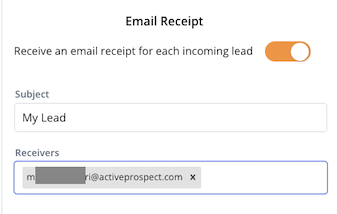

- Type the address(es) where you'd like to receive the receipt
- You may also modify the Subject line of the email
Step 3: Fields Mapping
Here you'll be able to map your Acuity Scheduling information with your Velocify fields.
- You will have Velocify fields on the left. Match the information you wish to pass align from Acuity Scheduling
- Based on Velocify functionality, some fields might be required; if this is the case, you can identify those fields with a * (star), so be sure to map all them
- You can also use the functions to customize information like reformatting dates and times or modifying text, phone numbers and so on.
- You may leave blank the box of a field's information you don't want to send through. Clicking on the Show unmapped fields button you will have visibility on all the available fields still not mapped
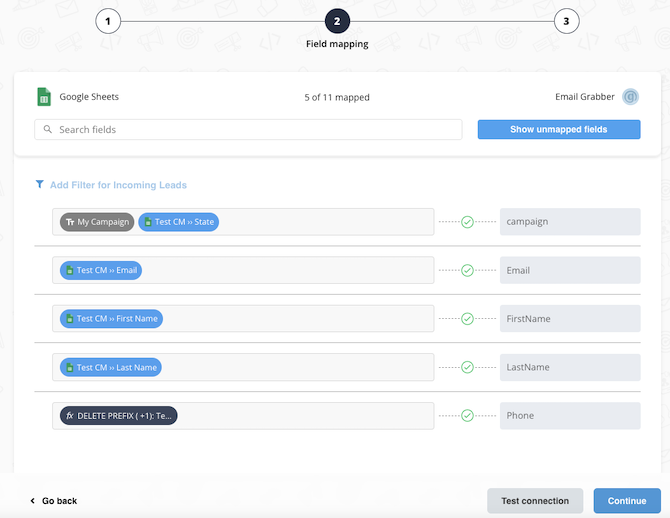

Step 3.A: Leads Filter (Optional)
If you'd like you could add a filter for incoming leads. This filter will sync only leads that meet the configured conditions
- Click on the link Add Filter for Incoming Leads on the top left
- A popup wil be opened where you can configure the filter
- You can define a series of condition to filter the leads. The lead will be synced only when all the conditions will be met
- Once finished, click the Save Changes button to switch back to the Fields Mapping to continue with the bridge configuration
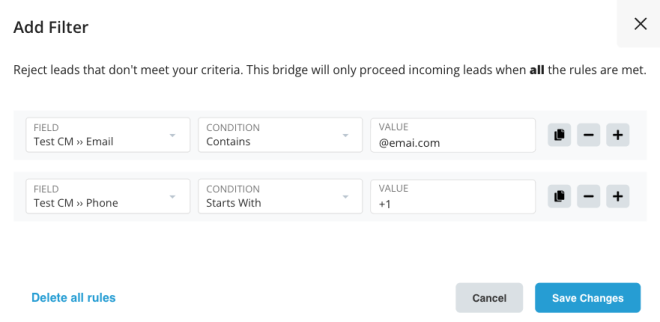

Step 4: Save and Publish
- Click on the Save and publish button
Congratulations! Now your bridge is up and running
Do you need help?
Here some additional resources:
- Acuity Scheduling documentation page and common questions
- Velocify documentation page and common questions
- LeadsBridge KNOWLEDGE BASE
- Contact support from your account clicking on the top right Support button






